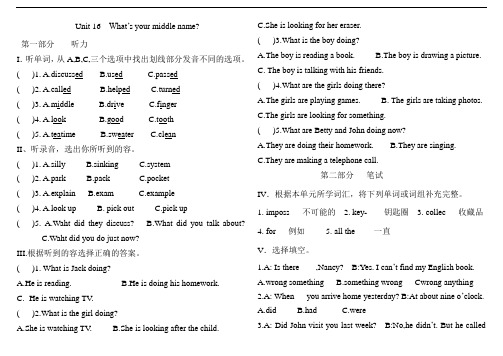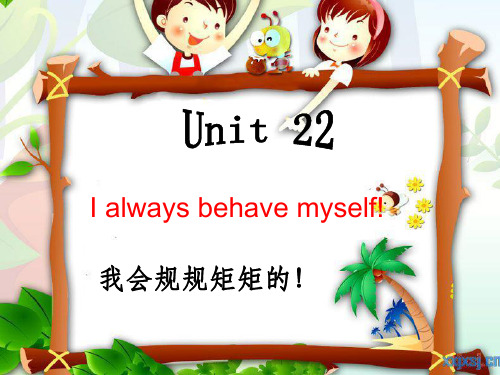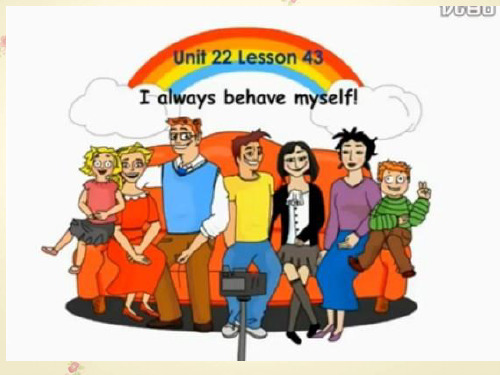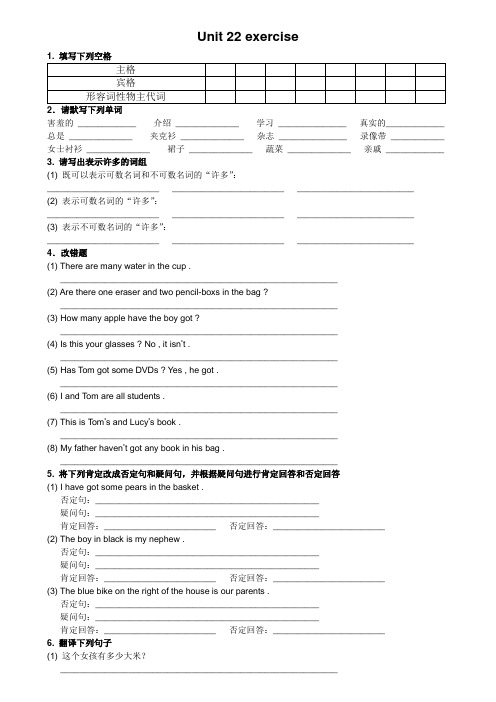unit 22 I always behave myself
新概念青少版2B unit 22课件

It will last two and a half hours.
PPT学习交流
10
p r sa h
[ʃɑ:p]
adv. 准时,正
PPT学习交流
11
He will go to school at half past seven sharp.
他将七点半准时到学校。
PPT学习交流
g
4. 你们打算什么时候见面?
What time _a_re____ yougo_i_n______to_ _____
meet?
g
PPT学习交流
17
6. I'll go and join them.(否定)
7. II'_m__g_o_in_is_gngt’oot g_e_t_u_p__atjo6i:n30thteomm.orrow.(一般疑问
witham goin to my friegnds. I __w_i_ll____ have a picnic with my friends.
2. 下个星期一你打算去干嘛? 我想去打篮球。
What __a_r_e____ _y_o_u_____g_o_in_g_____t_o ____d_o___
句)won’t or
________ _______ ________ to get up at 6:30
8.
Atormeorrowy?ou
We will meet at
going
the bus stop
at
10:30.(一般疑问
句)
10_:W3_0_i?_ll___ _y_o_u_____ meet at the bus stop at
新概念青少版2B考试卷

Unit 16 What’s your middle name?第一部分听力I.听单词,从A,B,C,三个选项中找出划线部分发音不同的选项。
( )1. A.discussed ed C.passed( )2. A.called B.helped C.turned( )3. A.middle B.drive C.finger( )4. A.look B.good C.tooth( )5. A.teatime B.sweater C.cleanII、听录音,选出你所听到的容。
( )1. A.silly B.sinking C.system( )2. A.park B.pack C.pocket( )3. A.explain B.exam C.example( )4. A.look up B. pick out C.pick up( )5. A.Waht did they discuss? B.What did you talk about?C.Waht did you do just now?III.根据听到的容选择正确的答案。
( )1. What is Jack doing?A.He is reading.B.He is doing his homework.C. He is watching TV.( )2.What is the girl doing?A.She is watching TV.B.She is looking after the child.C.She is looking for her eraser.( )3.What is the boy doing?A.The boy is reading a book.B.The boy is drawing a picture.C. The boy is talking with his friends.( )4.What are the girls doing there?A.The girls are playing games.B. The girls are taking photos.C.The girls are looking for something.( )5.What are Betty and John doing now?A.They are doing their homework.B.They are singing.C.They are making a telephone call.第二部分笔试IV.根据本单元所学词汇,将下列单词或词组补充完整。
北师大版高中英语必修一模块1 U1U2U3课文讲解

北师大版高中英语必修一模块1U1U2U3课文讲解------------------------------------------作者xxxx------------------------------------------日期xxxx课文原文M1 U1 L1 A Perfect DayPassage 1 A Couch PotatoForty-three-year-old Brian Blakey from Birmingham is sitting on his sofa and telling me about his perfect day.[When I wake up ]I don't get up immediately. I turn on thetelevision and watch the children's until about half past ten. Then I get up, go downstairs and switch on the TV in the living room. For lunch, I have biscuits and a glass of milk, and I watch the news. In the afternoon, I often watch– they're showing some good ones at the moment. In the evenings, I often watch TV series or sport and the news again I like the main news at six o'clock. At nine thirty, if there is a good play on BBC 2, I switch over and watch it. Then at night, I watch films and I usually switch off the TV at about two o'clock I never watch TV all night.I watch TV for sixteen or seventeen hours a day. I also do some exercise every day. I take Tina, [the dog], for a walk every afternoon. I don't go far, of course. I walk to the wall outside my house. I always take my portable TV and I sit on the stone wall [while the dog walks round in a circle].Of course, I couldn't live this lifestyle without a good wife.She's not here now (because she's working), but she always makes my meals. We haven't got much money, you know, but we're happy. Sitdown and watch TV Here's the remote control. You've got the world at your feet. And in your hand.Passage 2 A WorkaholicThirty-six-year-old Bob Black is sitting at his desk and working his way through his paperwork.I normally wake up about five minutes [before my alarm clock goes off]. As soon as I hear my alarm clock, I jump out of my bed.It takes me less than fifteen minutes to wash, get changed, have breakfast, leave home and get on a bus.I am always the first person to get to the office. The mornings are always very busy and the afternoons are even busier! Meetingsand phone calls take up a large part of the day. Every minute of the day is filled with urgent matters. By around eight o'clock, Iusually find some time to do my own paperwork and answer some personal e-mails.[When I get home at about ten], I look at some documents (that I bring back from the office) [so that I can be ready for the nextday's work]. I get to bed around midnight [when my wife and children are already asleep].I seldom have time for fun and other activities with my family. My family complains about it.But I try to work hard [so that I can make more money for them]. Besides, I get bored [if there's nothing to do]. I like being busy. U1 L4 City and CountryDebbie is an accountant in a large company in the centre of London.I need to be in my office by nine o'clock [so I usually get up at seven o'clock]. I travel to work on “the tube”. That's what people call the underground in London. It takes about fifty minutes. Usually, it's so crowded that I can't find anywhere to sit. I just stand. I'm always tired before I arrive at work. I don't like the underground!often get a sandwich in a nearby sandwich shop or I just have some biscuits and a cup of coffee. Then in the afternoon, I return to the paperwork in the office.On Monday nights, I have dance classes, and on Wednesday nights, I go to the gym. I need to do that [because I don't get enough exercise otherwise]. On Tuesday and Thursday nights, I have French classes. I work for a French company[ so I think study ing Frenchwill help me in my job].I go to the cinema almost every weekend. Sometimes, if the weather forecast is good, my friends and I drive to the countryside for a weekend break. We like to visit nice, quiet places [far away fromthe city] and go walking [where there are no shops, crowds or the tube]. That fresh air is so good for my lungs. I love it.Paul lives in a small village in the north of England.I usually get up at four o'clock every morning [when it's still dark]. I live and work on the farm //so I don't need to travel.After a big breakfast in my house, I walk out of the front door andI'm already at work.There are many things to do on the farm all day. We don't have the same work hours [that office workers in the city have]. We do jobs [when they need to be done] //and that could be early in the morning or late at night. I have cows, sheep, pigs and chickens on my far m.I have to make sure (that) they are free of sickness. I also grow wheat and vegetables //so there are many things to look after.In the evening, I like to play with my children. I have two children, [a boy and a girl]. They are six and eight years old. I also like to study. Right now I am studying Chinese by distance learning. I am very interested in China and it's my dream to see the Great Wall one day.I love movies. My wife calls me a “movie fan”. Butcinema in my village so I don't get the chance to go very often. Igo about twice a year,[ usually when I go to London with my family]. We take a weekend break there [when I am not too busy on the farm]. My wife loves looking [in the clothes shops ]and I like all the crowds and the noise. I also like to buy a few cigars. Unfortunately, my wife isn't them as I am. My son and daughter love to ride on London's red buses and they especially love to go on thetube!M1 U1 L1完美的一天Passage 1 终日懒散在家看电视的人-----沙发土豆(来自伯明翰的43岁的布莱恩*博莱克正坐在沙发上向我讲述他美妙的一天。
新概念青少版2Bunit22

Rain will come in gradually from the south west this evening.
今天晚上,雨将会从西南方逐渐来临。
编辑ppt
23
雨逐渐地大起来了。
The rain is gradually heavy.
编辑ppt
24
rain shower
n.阵雨
The whole country will have some rain showers in
•The birds won`t fly away to the south when the weather turns cold.
我想下个夏天北京的天气将会非常热。
•I think it will be very hot in Beijing next summer.
他将会使用他的笔
•He will use his pen
注意:在口语中,所编有辑pp人t 称都可以用will. 51
一般将来时的主要用法:
1、表示将来某一时刻的动作或状态: We will come to see you the day after
tomorrow. There will be a wonderful show next week.
2、表示将来某一段时间内经常的动作或状
态:
The students will come and work in the
lab once a week.
We will come and work in this factory
every year.
编辑ppt
52
今天晚上我将会打电话给你。 I will call you this evening.
unit_22_I_always_behave_myself

sound
over clear
gradually motor
last sharp until
till
celsius myself exhibition
forecast
reasonable
Lucy: Dad, there was a dance at school last month, and I didn't go. 这是 there be There'll be another one 句型在一般过 next Friday night. 去和一般将来 另一个 Can I go? 时的应用 William: Who 'll be at the dance?
将来时的特殊疑问句
Lucy: It'll be a school There will be some French student, but there won't be any outsiders. And our teachers will be there, too. 一般将来时在there
基本结构:There is/are/going to + do;There will/shall + do.
下周,将有一场足球比赛。
There will be a soccer match next week.
There is going to be a football game next week.
Lucy: Yes, Dad. Thanks. William: And Lucy, you will behave yourself, 反意疑问句,通常 won't you? 前后句是相矛盾的 Lucy: Of course, Dad. I always do!
新概念青少版2BUnit22

outsider: No outsider is going to do that again. sound: That sounds good. reasonable: This seems a reasonable guess. start: Start to choose a hobby. clear: Now everything is very clear. concert: Will there be a concert this afternoon? exhibition: When will the art exhibition open?
weeks.
放映结束 感谢各位的批评指导!
谢 谢!
让我们共同进步
Have you seen this movie?
Is it fun?
behave yourself/myself
[bi‘heiv jɔ:‘self/mai‘self]] 行为规矩
outsider [aut'saidə(r)] 外人
sound
[saund]
听起来
reasonable ['ri:zənəbəl]
exhibition [ˌeksɪˈbɪʃn] 展览
游戏规则:老师出几根手指,学生就要读几遍, 老师出“1”,就读一遍;出“2”就跟读两遍;
但当老Байду номын сангаас出拳头时,学生则不读,次数读错则输, 读对则赢。
规则:全班分为两组,将两张椅子放 在台前,一张表示true, 一张标识false,然后各 组派一人站在起跑线后面,看老师展示的单 词卡片并听题目,如老师拿着一张ant的单词 读arm, 则代表必寻跑到false的椅子坐下,速度快 又答对的为该组加分。
青少版新概念2B Unit 22

1、
What was there at school last month? Who didn’t go ? What about next Friday night?
Picture 1
There was a dance at school last month.
is---was
不定冠词表类 别
Word stress
’student be’have ’Saturday out’sider after’noon
New words and Expressions:
lecture n. 讲座
till
until
prep.直到,至
prep.直到(某个时刻)为止
concert
over motor exhibition
Picture 5
and I’ll pick you up.
pick sb. up 指用车接
Be at the school gates at 10 o’clock sharp.
副词,“准时,正” 指在确切的时间
Picture 5
祈使句,at 后跟 一具体地点
Is that clear?
同义句: Do you understand?
Unit 22
I always behave myself ! 我会规规矩矩的!
一般现在时,表永恒的事实。
New words and Expressions:
behave yourself/myself
(你/我)举止端正,行为规矩
outsider
sound
n.
外人,非.
v. v. adv. adj.
6、
Will Lucy behave herself?
Unit 22 I always behave myself! 知识点(讲义)新概念英语青少版2B

Unit 22 I always behave myself! 我会规规矩矩的!一、重点单词及拓展:1.out, outside, outsider1)out 形容词;副词;介词;意思是外面的;向外;从...出来等。
短语:come out 出来;出版go out 出去look out 小心look out of...从...向外看take out 拿出out of date 过时2)outside 名词,外面;副词,在外面;介词,在...外面例:The outside world is quite wonderful. 外面的世界很精彩。
(形容词)Someone is waiting for Tom outside. 外面有人在等Tom. (副词)3)outsider 名词,外行;旁观者;局外人例:She was an outsider, alone and lonely. 她是个孤单寂寞的局外人。
2.sound的用法1)名词(不可数),声音,响声,可以指大自然中的任何声音。
例:The man was gone, his footsteps made no sound. 那人走了,他的脚步没有发出一点声音。
注意:voice也是声音的意思,一般指人的声音,说话、唱歌、谈笑;noise指噪音。
2)动词,听起来(后通常接形容词),发出声音三单为sounds, 过去式为sounded, 现在分词为sounding 例:That English song sounds very nice. 那首英文歌听起来非常好听。
3)形容词,合理的;健全的。
常用短语:safe and sound 平安无恙例:That’s a sound reason. 那是个合理的原因。
造句练习1:1)Robert的书下个月就要出版了。
2)请拿出课本,并翻到第22页。
3)我喜欢那里的景色(sight)和声音。
4)那个故事听起来很有趣。
新概念青少版2B Unit22

lecture ['lektʃə] 讲座 till [til] 直到 until [ən'til] 直到...为止 concert ['kɔnsət] 音乐会 over ['əuvə] 超过 motor ['məutə] 汽车的 exhibition [ˌeks ɪˌb ɪʃn] 展览
游戏规则:老师出几根手指,学生就要读几遍, 老师出“1”,就读一遍;出“2”就跟读两遍; 但当老师出拳头时,学生则不读,次数读错则输, 读对则赢。
3. A: Will there be a lecture this evening? B:Yes, there will. A: Will it last long? B:It'll last from5 till/untill 6. 4.A: When will the lecture start? B:It'll start at 5 o'clock, and last (for) an hour. 5.A: When will the motor show open? B:It'll open on the 15th, and last(for)two weeks.
规则:全班分为两组,将两张椅子放
在台前,一张表示true, 一张标识false,然后各
组派一人站在起跑线后面,看老师展示的单 词卡片并听题目,如老师拿着一张ant的单词 读arm, 则代表必寻跑到false的椅子坐下,速度快 又答对的为该组加分。
outsider: No outsider is going to do that again. sound: That sounds good. reasonable: This seems a reasonable guess. start: Start to choose a hobby. clear: Now everything is very clear. concert: Will there be a concert this afternoon? exhibition: When will the art exhibition open?
新概念 2B Unit 24 I always behave myself

也,用在句 末,用逗号 隔开
否定句中用 some,疑问 否定any换
Q:
What time will the school event start? How long will the school event start?
month, and I didn't go. There'll be another one next Friday night.Can I go? WILLIAM: Who'll be at the dance? 不定代词,
指dance
who will
Picture 2
LUCY: It'll be a school event. There will be some
正当的,合理的
concert
exhibition
Q:
When was there a dance at school? When will there be another dance?
Picture 1
there be 句型一般过去式和 一般将来时
另一个
LUCY: Dad, there was a dance at school last
There will be some French student but there won't be any outsiders.
在这里指校外的人
behave
守规矩
behave oneself
新概念 1B Unit 22 test

Unit 22 exercise2.请默写下列单词害羞的____________ 介绍_____________ 学习______________ 真实的____________ 总是_____________ 夹克衫_____________ 杂志______________ 录像带___________ 女士衬衫_____________ 裙子_____________ 蔬菜_____________ 亲戚____________ 3. 请写出表示许多的词组(1) 既可以表示可数名词和不可数名词的“许多”:_______________________ _______________________ ________________________(2) 表示可数名词的“许多”:_______________________ _______________________ ________________________(3) 表示不可数名词的“许多”:_______________________ _______________________ ________________________4.改错题(1) There are many water in the cup ._________________________________________________________(2) Are there one eraser and two pencil-boxs in the bag ?_________________________________________________________(3) How many apple have the boy got ?_________________________________________________________(4) Is this your glasses ? No , it isn’t ._________________________________________________________(5) Has Tom got some DVDs ? Yes , he got ._________________________________________________________(6) I and Tom are all students ._________________________________________________________(7) This is Tom’s and Lucy’s book ._________________________________________________________(8) My father haven’t got any book in his bag ._________________________________________________________5. 将下列肯定改成否定句和疑问句,并根据疑问句进行肯定回答和否定回答(1) I have got some pears in the basket .否定句:______________________________________________疑问句:______________________________________________肯定回答:_______________________ 否定回答:_______________________(2) The boy in black is my nephew .否定句:______________________________________________疑问句:______________________________________________肯定回答:_______________________ 否定回答:_______________________(3) The blue bike on the right of the house is our parents .否定句:______________________________________________疑问句:______________________________________________肯定回答:_______________________ 否定回答:_______________________6. 翻译下列句子(1) 这个女孩有多少大米?_________________________________________________________(2) 那44个学生都在校车上。
勤于思考善于观察英文作文

勤于思考善于观察英文作文I always find myself pondering about life and its complexities. It's fascinating to observe how people behave and interact with each other in different situations. 。
The way the sunlight filters through the leaves, creating a mesmerizing pattern on the ground, never fails to catch my attention. 。
I often catch myself getting lost in thought while observing the hustle and bustle of city life. It's amazing how everyone is so absorbed in their own little world, oblivious to the chaos around them. 。
The way a child's eyes light up when they discover something new is truly heartwarming. It's a reminder to always stay curious and open-minded. 。
Sometimes, I find myself lost in the beauty of nature, marveling at the intricate details of a flower or the waythe waves crash against the shore. 。
新概念英语青少版 2b Unit 22

Grammar
一般疑问句: 把will提到(tí dào)there之前。
Will there be only one country?
Yes, there will. / No, there won’t.
第十七页,共二十五页。
Pattern Practice
1. A: Will there be a lecture this afternoon?
behave behave yourself/myself = behave
well behave well/badly =act in an
appropriate/inappropriate manner behavior n.行为(xíngwéi),举止
第三页,共二十五页。
Lesson 43
outsider= people from outside our normal social group
第七页,共二十五页。
Lesson 43
last eg. How long will it last?
It will last two and a half hours.
第八页,共二十五页。
Lesson 43
sharp= on time焦点(jiāodiǎn)副词 ,强调“在确切的时间”
eg. He will go to school at half past seven sharp.
reasonable adj. 正当的,合理 的
start v. 开始
last v. 持续,延续
sharp adv.(focus, after expressions of definite time) 准时,正
青少版新概念_2B_unit22(课堂)_2022年学习资料

There be句型练一练-1.There-a party in our school this week nd.-A.will have-B.is going to have-C.is going to hasill be-2.There-many trees here two years ago-A.was-C. re-were-3.There-an important meeting tomorrow.-B.will has-C.are going to beis going to be-4.-there-milk yes erday?-A.Is,some-C.Are,any-.Wer.om-5
sound-[saund]-n.声音-v.听起来-Does sound travel in water?his piece of music sounds beautiful.-His plan sounds、great-B、well-c、coolly I-D、badly
It sounds interesting-它听起来很有意思-It sounds like thunder -听起来像雷声。-那听起来非常无聊-T
Written exercises.P48-Listening Exercise.P49
behav-[bi'heiv]-V.使守规矩
吸罗开新进-behave-[bi'heiv]-V.使守规矩-10
behave yourself-宵邵和骨坚平靠特宵-举止端正,行为规矩-手-离笔尖-你将会守规矩的,不是吗 -You will behave yourself,won't you?-11-张滨画
Unit 22-I always behave myself!-1
- 1、下载文档前请自行甄别文档内容的完整性,平台不提供额外的编辑、内容补充、找答案等附加服务。
- 2、"仅部分预览"的文档,不可在线预览部分如存在完整性等问题,可反馈申请退款(可完整预览的文档不适用该条件!)。
- 3、如文档侵犯您的权益,请联系客服反馈,我们会尽快为您处理(人工客服工作时间:9:00-18:30)。
New words and expressions
• • • • • • • 1. lecture n. 讲座 2. till prep. 直到,至 3. until prep. 直到(某个时间)为止 4. concert n. 音乐会 5. over prep. 超过 6. motor adj. 汽车的 7. exhibition n. 展览,展览会
• Lucy: Dad, there was a dance at school • last month, and I didn't go. 这是there be • 句型在一般过 There'll be another one 去和一般将来 • next Friday night. 另一个 时的应用 • Can I go? • William: Who 'll be at the dance?
behave:vi.表现;举止端正;自然反应 vt.使守规矩
There be 句型
• 一、构成:There be ...句型表示的是 “某处 有(存在)某人或某物”,其结构为
• There be(is,are,was, were )+名词+地点状语。
• 我们班有52个学生。 • There are fifty-two students in our class • 五年前,河边有一处老房子 • There was an old house by the river five years ago.
将来时的特殊疑问句
unit 22 I always behave myself
• Lucy: It'll be a school event. • There will be some French student, • but there won't be any outsiders. • And our teachers will be there, too.
准时,就是exactly
unit 22 I always behave myself
• Lycy: Yes, Dad. Thanks. • William: And Lucy, • you will behave yourself, 反意疑问句,通常 • won't you? 前后句是相矛盾的 • Lucy: Of course, Dad. I always do!
一般将来时在there be 句型的否定形式, won't是 will not的缩写。 也,通常用在句尾, 有逗号隔开。
否定句中, 用any代替some。
unit 22 I always behave myself
• William: That sounds reasonable, • What time will it start? • Lucy: At half past seven.
gossip
concert yourself
lecture
behave start
sound
over clear
gradually
last sharp until
motor
outsider
till
celsius myself exhibition
forecast
reasonable
unit 22 I always behave myself
ห้องสมุดไป่ตู้
unit 22
I always behave myself
Do you know what is "behave"
What is "ball?"
New words and expressions
• 1. behave yourself/myself 举止端正,行 为规范 • 2. outsider n. 外人,非成员 • 3. sound v. 听起来 • 4. reasonable adj. 正当的,合理的 • 5. start v. 开始 • 6. last v. 持续,延续 • 7. sharp adv. 准时,正 • 8. clear adj. 容易听清的,明白的
unit 22 I always behave myself
带去... • William; All right, Lucy. • Your mother will take you there, 接某人, • and I'll pick you up. 等于meet • Be at the school gates • at 10 o'clock sharp. • Is that clear?
there be句型+一般将来时
• 1.概念:表示将要发生的动作或存在的状态及打 算、计划或准备做某事。 • 2.时间状语:tomorrow, next day(week, month, year…),soon, in a few minutes, by…,the day after tomorrow, etc. • 3.基本结构:There is/are/going to + do;There will/shall + do. • 下周,将有一场足球比赛。 • There will be a soccer match next week. • There is going to be a football game next week.
听起来,经常用 作主系表结构中
unit 22 I always behave myself
• William: And how long will it last? • Lucy: For two and a half hours. • It'll finish at 10.
对一段时间的提问, 通常用for加一段时 间作为回答
